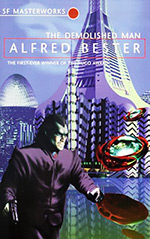
![]() SarahPi
SarahPi
3/22/2012
![]()
I decided that the book that won the first Hugo would be the perfect place to start the Grandmaster Challenge.
The Demolished Man is a strange combination: outwardly pulp, but with a thoughtful exploration at its core. It is science fiction, insofar as it takes place in a potential future, and is full of the standard trappings of pulp SF: flying cars and routine space flight and video phones. The plot is pure mystery, if you don't mind a mystery where you witness the crime and then jump perspectives between that of the killer and the detective who is chasing him. The book's Big Questions involve how to commit a murder in a society patrolled by citizens with ESP (espers), and how to catch said murderer.
I found it to be a quick and interesting read, but my enjoyment was hampered by the fact that I didn't really like any of the characters. The women are horribly cliched bimbos and ninnies, treated like children and playthings, all destined to fall in love with the men who ignore them. The main characters are only slightly better fleshed out. In the context of its time I can understand some of the misogyny inherent in the portrayal of women, though I found it awfully difficult to wade through those passages.
The reader is thrown into Ben Reich's head in time to see him make his shift toward murder, but too late to understand how he got there. A lot of tell, very little show. This turns out to be a necessary sleight of hand, but not one I appreciated. Other detractions involved some messy changes of perspective, and a whole lot of overwrought exclamation-mark-happy dream imagery.
That's not to say there's nothing to like. There are some well-painted scenes, and one particularly unnerving dream sequence. Bester plays some neat tricks with typography as he describes the way that the espers interact. My favorite parts of the book involved the esper culture, its school and code of conduct.
I'm also a sucker for past-colored futures. I love reading early SF for the ways in which their most cutting-edge technology influences the technology they envision. And so the computers of the future are still giant punch-card reading machines, albeit punch-card readers with innovative uses. Messages can pass between planets, but they use clunky pre-established codes. Proving that some things never change, the latest fashion fad is tights that are literally rather than figuratively sprayed on.
I can't say I loved the book, but I think it's a worthy winner of the first Hugo. It's an idea book, like the best SF, and like the best SF it allows people to look at an aspect of humanity through the prism of otherness. Its world is well-imagined; too bad it's populated with such an irritating cast of characters.